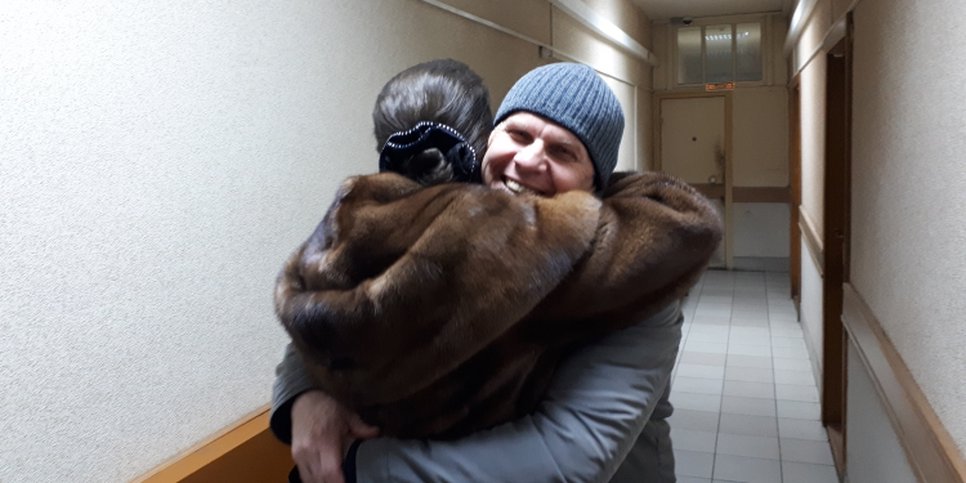Photo: Vladimir Alushkin after 184 days behind bars. January 2019
Photo: Vladimir Alushkin after 184 days behind bars. January 2019
"Systemic and Institutionalized Persecution of Jehovah's Witnesses." The UN Working Group issued a second decision on Russia
Penza Region, SwitzerlandOn October 1, 2019, the second decision of the UN Working Group on Arbitrary Detention concerning Jehovah's Witnesses in Russia was received. This time, the arrest of Vladimir Alushkin from Penza was declared illegal. The Working Group is concerned about the "systemic and institutionalized persecution of Jehovah's Witnesses" (para. 65).
What was the first decision of the Working Group on Complaints of Russian Jehovah's Witnesses? On May 29, 2019, a document was received following the consideration of the complaint of Dmitry Mikhailov from Shuya (Ivanovo region). His arrest was found to be a manifestation of religious discrimination.
What conclusions did the Working Group reach on the complaint of Vladimir Alushkin (excerpts):
Abs. 51-52: "The decision to initiate a criminal case alleged that Alushkin was a religious minister of Jehovah's Witnesses and "exercised general direction" of their activities in the city of Penza, which was illegal after the decision of the Supreme Court of April 20, 2017. In particular, it was assumed that they had committed a crime in "conducting conversations in public places and living quarters with residents of Penza ... and the involvement of new participants from among their relatives, acquaintances and residents of Penza", as well as holding worship services to "study its ideology". The Working Group cannot accept that any of these activities could be described as organizing or participating in the activities of an extremist organization. The Working Group is unable to find any other reason that could justify the restriction of his rights under article 18 of the Covenant. All the activities in which Alushkin took part are an absolutely peaceful religious discussion."
Abs. 53: "The search of Alushkin's home and the seizure of his Bibles and religious texts, which he used in worship, also constitute an interference with his rights under article 18 of the Covenant."
Abs. 63: "The Working Group concludes that Alushkin's detention had no legal basis, as the Pervomaiskiy District Court and the Penza Regional Court did not comply with the basic condition for ordering this measure."
Abs. 65: "The Working Group particularly wishes to draw attention to the latest joint complaint in which special procedures mandate holders expressed concern about 'the issue of systemic and institutionalized persecution of Jehovah's Witnesses.'"
Abs. 67: "Alushkin's actions have always been completely peaceful, and there is no evidence that he or other Jehovah's Witnesses in Russia ever used violence or encouraged others to violence. The Working Group notes that Alushkin is only one of a growing number of Jehovah's Witnesses in Russia detained and imprisoned who have been charged with criminal activity on the grounds that they were simply exercising the right to freedom of religion, a right protected by article 18 of the Covenant. The Working Group therefore concludes that Alushkin's detention and detention was a manifestation of religious discrimination."
Abs. 68: "All these cases relate to the fact that the peaceful religious activities of Jehovah's Witnesses were characterized as 'extremist', which led to the detention and imprisonment of those who belong to this religion. Therefore, while this Opinion relates to Alushkin's particular circumstances, the Working Group wishes to emphasize that its conclusions in this Opinion apply to all other persons in circumstances similar to those of Alushkin."
Abs. 71-72: "An appropriate measure of protection would be the unconditional release of Vladimir Alushkin and the granting of his enforceable right to receive compensation and other forms of reparation in accordance with international law. The Working Group urges the Government to ensure a full and independent investigation into the circumstances of the arbitrary deprivation of liberty of Vladimir Alushkin and to take appropriate measures against those responsible for the violation of his rights."
What is the Working Group on Arbitrary Detention? This is a structure under the UN designed to investigate cases of detention that do not comply with international standards set forth in the Universal Declaration of Human Rights and other international documents. The Working Group has the right to receive information from the authorities and non-governmental organizations and to meet with detainees and their families in order to establish the facts. The Working Group submits its conclusions and recommendations to governments, as well as to the UN Human Rights Council. Although the decisions of the Working Group are not binding on States, they can help to soften the position of the authorities in the face of wide international publicity.
Jehovah's Witnesses filed complaints with three different international bodies: the European Court of Human Rights, the UN Human Rights Committee, and the UN Working Group on Arbitrary Detention.
Go to document





